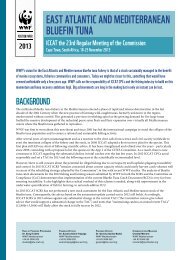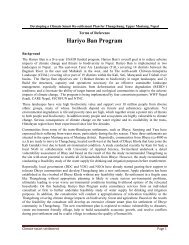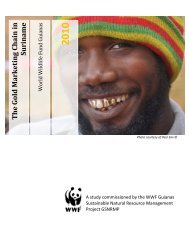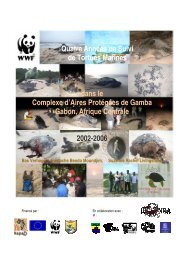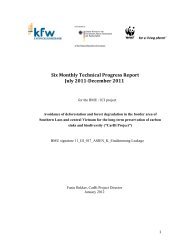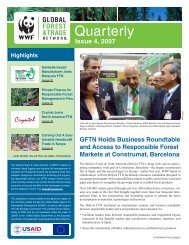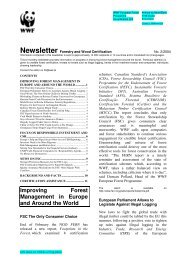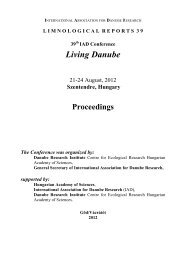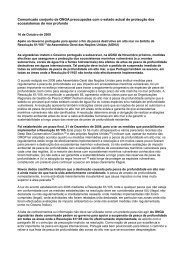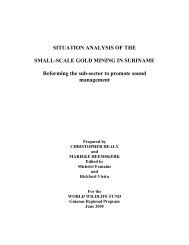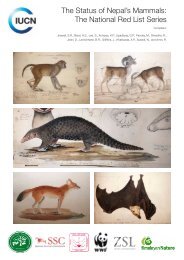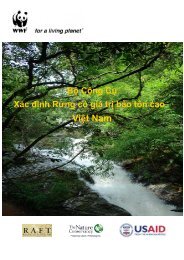The South Africa – Viet Nam Rhino Horn Trade Nexus (PDF ... - WWF
The South Africa – Viet Nam Rhino Horn Trade Nexus (PDF ... - WWF
The South Africa – Viet Nam Rhino Horn Trade Nexus (PDF ... - WWF
Create successful ePaper yourself
Turn your PDF publications into a flip-book with our unique Google optimized e-Paper software.
situation at the end-use market: viet nam<br />
trade issues seems to grip the highest echelons of government and sets the tone through most other<br />
layers of official administration. That fact, in turn, serves to foster an acute “sensitivity” and an official<br />
state of denial concerning the fact that <strong>Viet</strong> <strong>Nam</strong> is driving <strong>Africa</strong>’s rhino crisis unlike any other country<br />
in the world today. Collaborative engagement with <strong>South</strong> <strong>Africa</strong> and the broader CITES community<br />
to scale-up and seriously address rhino horn crime seems to remain in the realm of perfunctory obligation<br />
rather than evolve into a vigorous, innovative commitment of common goals and imperatives.<br />
Even the recent total extinction of the only extant rhino population in <strong>Viet</strong> <strong>Nam</strong>, an endemic subspecies<br />
no less, has been met by key government ministries with studied indifference, rather than serving<br />
as a galvanizing wake-up call of a serious, in-country conservation failure of irreplaceable dimensions.<br />
If such significant biodiversity losses at home are regarded as essentially unremarkable events, the<br />
destruction of entire rhino populations in faraway <strong>Africa</strong> are probably of even less consequence in the<br />
national psyche. In the meantime, the criminal syndicates behind <strong>Viet</strong> <strong>Nam</strong>’s recent national obsession<br />
for rhino horn continue to consolidate their low-risk, high-profit operations at home and in <strong>Africa</strong>, and<br />
further enrich themselves at the expense of unleashing a pronounced corrupting influence on both<br />
government and society. In the process, the international reputation of <strong>Viet</strong> <strong>Nam</strong> is steadily diminishing<br />
in the eyes of a world desiring a positive conservation future for the five beleaguered rhino species.<br />
With respect to the rhino horn trade in <strong>Viet</strong> <strong>Nam</strong>, the following recommendations are offered:<br />
Concerning political will<br />
• <strong>The</strong> need for strong political will to make rhino horn crime a national priority: It is vitally important that the<br />
highest political leadership in <strong>Viet</strong> <strong>Nam</strong> recognize the serious nature of <strong>Viet</strong> <strong>Nam</strong>’s continuing illegal<br />
trade in rhino horn and speak out against it in an unequivocal manner. Such trade is indirectly compromising<br />
conservation efforts within <strong>Viet</strong> <strong>Nam</strong>, and directly undermining the conservation policy of <strong>South</strong><br />
<strong>Africa</strong>, a key <strong>Africa</strong>n ally, resulting in the unprecedented loss of not only hundreds of protected rhinos,<br />
but also serious loss of human life, especially those on the front lines of the country’s anti-poaching<br />
response. <strong>The</strong> perception of official government tolerance has been created through the numerous documented<br />
instances in which senior <strong>Viet</strong>namese government officials have been directly implicated in the<br />
trade, for example the situation that prevailed at the <strong>Viet</strong> <strong>Nam</strong> Embassy in <strong>South</strong> <strong>Africa</strong> in recent years.<br />
It is incumbent on the country’s top leaders to develop and publicize a “zero tolerance” policy against<br />
any government official found to be trading in controlled wildlife commodities. Further, considered<br />
<strong>Viet</strong>namese embassy employee in Pretoria.<br />
5050/sabC2<br />
condemnation of rhino horn usage, both as an unverified medicinal product for serious illness and as a<br />
non-essential, detoxifying antidote to excessive indulgence, should be promoted.<br />
Concerning policy and legislation<br />
A review of national policy and legislation with a specific focus on rhino horn trade is needed to identify<br />
and close gaps and legal loopholes which currently give rise to rhino horn trade and consumption.<br />
Special attention should be paid to the following issues:<br />
• <strong>The</strong> need to review penalties for illegal rhino horn trade: Given the escalating prices for rhino horn on the<br />
<strong>Viet</strong>namese market, current penalties for rhino horn smuggling and illegal trade, possession or usage<br />
need to be evaluated and updated to ensure that they serve as an effective deterrent.<br />
• <strong>The</strong> necessity of addressing infractions regarding legally imported rhino horn trophies from <strong>South</strong> <strong>Africa</strong><br />
entering commercial trade: As documented in this report, pseudo-sport hunting in <strong>South</strong> <strong>Africa</strong> involving<br />
questionable <strong>Viet</strong>namese hunters has resulted in a plethora of rhino horn trophies being imported<br />
into <strong>Viet</strong> <strong>Nam</strong>. It is not clear whether current legislation makes sufficient provision for addressing<br />
instances where these “personal effects” trophies are used for “commercial purposes’” in violation of<br />
CITES. <strong>The</strong> obligations concerning legal rhino horn ownership need to be carefully reviewed in order<br />
to comply fully with CITES requirements.<br />
• <strong>The</strong> importance of curtailing internet advertising and trading in rhino horn: <strong>The</strong> proliferation of internet<br />
trading in endangered species products represents an evolving challenge to wildlife authorities on a<br />
global basis. As rhino horn is commonly marketed in <strong>Viet</strong> <strong>Nam</strong> through the internet, the authorities<br />
need to ensure that the country’s wildlife trade legislation adequately provides legal authority to act<br />
against internet traders in a proactive and forceful manner. Websites selling rhino horn and other endangered<br />
species products should be shut down and perpetrators prosecuted.<br />
• <strong>The</strong> significance of addressing “fake” rhino horns in the marketplace: <strong>The</strong> trade in “fake” rhino horns<br />
constitutes a kind of fraud in its own right, but more importantly contributes to the social perception<br />
of rhino horns as a rare and valuable commodity, which in turn generates demand for authentic horns.<br />
Wildlife legislation needs to be reviewed and updated to ensure that this avenue of trade can be curtailed<br />
and legally addressed in an efficient manner.<br />
Concerning law enforcement and regulation<br />
A range of improvements and changes in current law enforcement and regulatory practices are called for<br />
if illegal trade in rhino horn in <strong>Viet</strong> <strong>Nam</strong> is to be adequately addressed. <strong>The</strong> following issues are of particular<br />
concern:<br />
• <strong>The</strong> importance of developing and implementing bilateral treaties to promote collaborative law enforcement<br />
action: <strong>The</strong> immediate adoption and implementation of the draft Memorandum of Understanding between<br />
<strong>South</strong> <strong>Africa</strong> and <strong>Viet</strong> <strong>Nam</strong> to underpin future law enforcement collaboration between the two nations on<br />
rhino crime cases is needed. Scaled-up law enforcement, including a programme of investigative assistance,<br />
should necessarily follow the formal signing of this treaty. Within the <strong>South</strong>east Asian region, the use of<br />
ASEAN-WEN as a platform for enforcement agencies to collaborate in addressing rhino horn crime should<br />
be explored, as well as the INTERPOL officer based in Bangkok. <strong>Viet</strong> <strong>Nam</strong>’s trade has linkages with Thailand<br />
and Lao PDR in particular, so this vehicle could afford a basis for engagement and joint action.<br />
• <strong>The</strong> requirement for a strict regulatory mechanism to track legal rhino horn trophies: As documented in<br />
this report, pseudo-sport hunting in <strong>South</strong> <strong>Africa</strong> involving questionable <strong>Viet</strong>namese hunters has resulted<br />
in a plethora of rhino horn trophies being imported into <strong>Viet</strong> <strong>Nam</strong> legally. On the other hand,<br />
there does not appear to be any kind of regulatory framework in place to ensure that these “personal<br />
effects” are not used for “commercial purposes” in violation of CITES. <strong>The</strong> failure to regulate such trade<br />
constitutes an avenue of trade and should be addressed as a matter of urgency. Thus, an ongoing programme<br />
to track legal rhino horn trophies in the private sector is required. Private possession of rhino<br />
horns should only be allowed under special ownership permits in which individual horn trophies are<br />
licenced to a particular physical address and owner. Any subsequent movement of these trophies to<br />
a new address or transfer to a new owner (including other family members) should only transpire by<br />
amending the ownership permits prior to the actual transfer of the rhino horn trophy.<br />
146 the south africa <strong>–</strong> viet nam rhino horn trade nexus TRAFFIC 147



